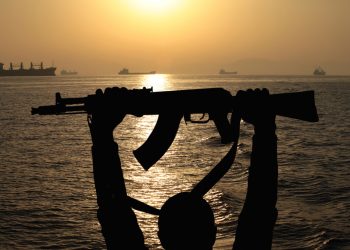According to figures from the International Maritime Bureau
 There have been a record number of pirate attacks but anti-piracy measures have been successful in reducing hijacks, according to figures from the International Maritime Bureau (IMB).
There have been a record number of pirate attacks but anti-piracy measures have been successful in reducing hijacks, according to figures from the International Maritime Bureau (IMB).
The IMB’s latest global piracy report shows that Somali pirates were behind 56% of the 352 attacks worldwide reported in the first nine months of 2011 – 199 compared with 126 in the same period of 2010.
However, despite the increase in attacks, the pirates have been less successful, hijacking 24 vessels in 2011 to date compared with 35 in the same period of 2010 – representing a 12% success rate compared with 28%.
The IMB credits this reduction in hijackings to “policing and interventions by international naval forces, correct application of the industry’s latest Best Management Practice – including the careful consideration of the crews’ retreat to a ‘citadel’ – and other onboard security measures”.
However, the human cost of piracy worldwide had seen 625 people taken hostage with eight killed and 41 injured.
As well as more attacks in the Red Sea during the monsoon season in the Indian Ocean, IMB warns that the West African coast off Benin is seeing a surge in violent piracy. While there were no incidents in the area in 2010, this year there have been 19 attacks and eight tanker hijackings. “Armed pirates board and hijack the ship – sometimes injuring crew – then force the master to sail to an unknown location where they steal the ship’s properties and cargo, and let the vessel free,” reports IMB.
In response, Benin has begun joint naval patrols with neighbouring Nigeria, another piracy hot spot.
Piracy and armed robberies in Asian waters, including the Indian subcontinent, were down from 106 in the first three quarters of 2010 to 87 in the same period of 2011.
Confirming the IMB’s warnings about West Africa, two offshore oil workers were kidnapped in two separate attacks off Nigeria in recent week. Both incidents involved Exxon Mobil supply ships – on 17 October, pirates are reported to have captured a tug master, and on 30 September, gunmen wounded one person and kidnapped another in an attack on another ship. On a more positive note, Nigerian pirates are reported to have released the Marshall Islands-flagged oil tanker Cape Bird and 20 crew, which had been hijacked off Nigeria on 9 October.
Current figures from the IMB show that Somali pirates are holding captive about 15 vessels and 277 hostages. Hostages continue to include seven Indian seafarers from the Asphalt Venture still held captive despite the payment of a ransom in April.
Other recent incidents reported to the IMB’s worldwide Piracy Reporting Centre include:
- Six pirates armed with guns and rocket-propelled grenade chased and fired on a containership 35 nautical miles off Zanzibar, Tanzania on 17 October. The pirates moved away after the ship raised the alarm, increased speed, took evasive manoeuvres, the crew mustered in the citadel, and the onboard armed security team switched on deck lights, activated fire hoses and returned fire.
- About five pirates armed with guns chased a bulk carrier off Comoros, in the Mozambique channel, on 11 October. The ship increased speed and took evasive manoeuvres, the crew retreated to the citadel and the onboard armed security team took up position. The pirates abandoned their attempt to board the ship. A further two skiffs approached and attacked the ship but gave up as the ship resumed evasive manoeuvres.
- Five pirates armed with pistol and long knives boarded a tug in the Singapore Straits on 10 October and escaped with crew cash and personal belongings.
Source: ITF





























































